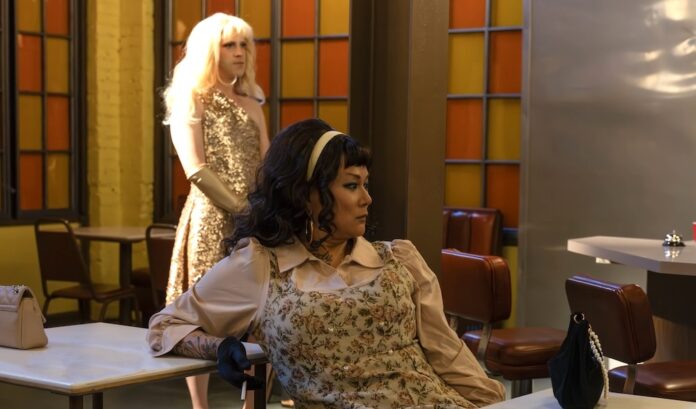The Compton’s Cafeteria Riot, a powerful piece of immersive theater, returns to San Francisco’s Tenderloin District on Fri/11.
Opening in a newly transformed 1960s-style venue on Larkin Street, this gripping and interactive play (which runs through July 26) puts the audience at the heart of a historic moment that predates the pivotal Stonewall Uprising by three years—one that ignited a movement, and declared loudly that trans and queer people were mad as hell and not going to take it anymore.
Presented by the Tenderloin Museum, this bold revival invites audiences to take a seat—literally—at 1966-era Compton’s Cafeteria.
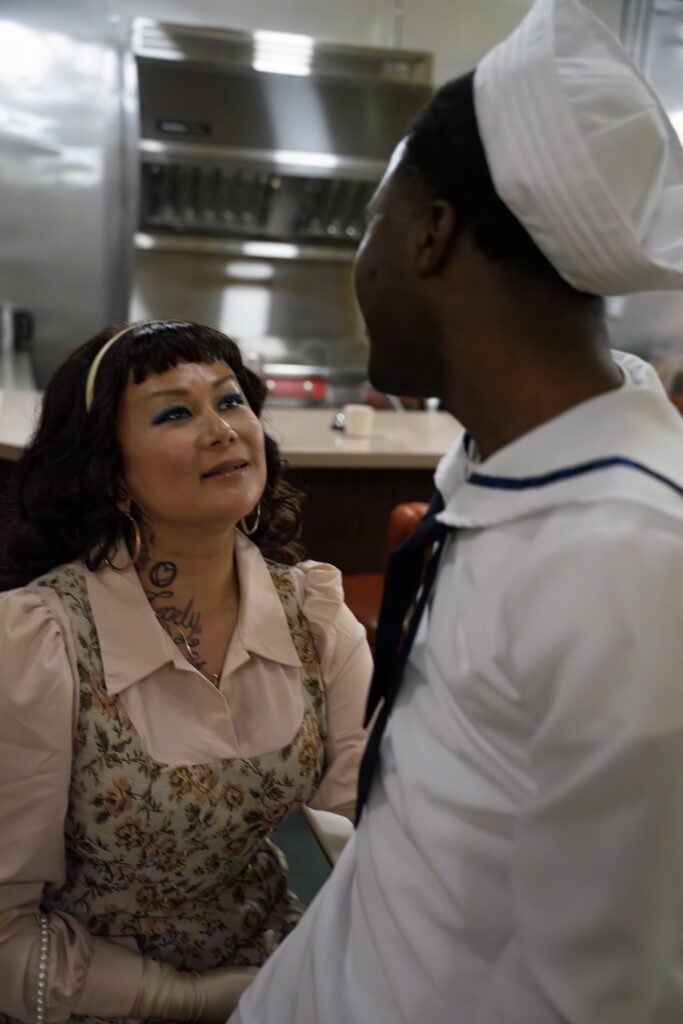
Set during that incendiary night when trans women and drag queens fought back against police harassment, the production is more than just a history lesson; it’s a visceral, multi-sensory experience. The audience sits among actors over a meal of “breakfast for dinner” as chaos, courage, and community erupt.
The Compton’s Cafeteria Riot was co-written by trans activists and decades-long members of the Tenderloin’s queer community, Collette LeGrande and Donna Personna, alongside playwright and actor Mark Nassar.
Personna recalls arriving in Swinging Sixties San Francisco as a 17 year old, fleeing the constraints of a deeply religious household in San Jose. LeGrande was just 15 when she ran away and found the Tenderloin, a neighborhood that allowed her to begin discovering her authentic self, during what was known as the “cultural decade.” Their insights give the play its emotional authenticity and grounding in lived experience.
Originally staged in 2018, the production has been reimagined and expanded for 2025, this time directed by Ezra Reaves, a boundary-pushing artist known for their work in immersive theater. Reaves, who previously collaborated with Nassar on The Speakeasy, brings a unique perspective as both a queer historian and an experimental theater maker.
Their approach to the new staging includes fresh elements, like period-appropriate music played from a jukebox, to deepen the immersive feel and emotional resonance of the story.
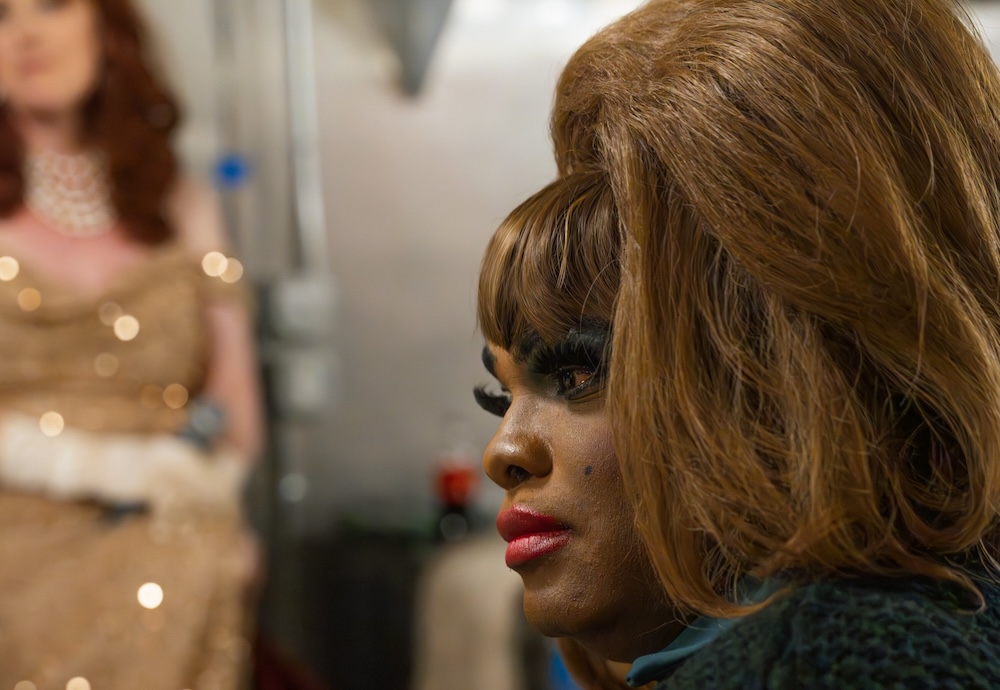
Reaves’s creative vision also incorporates archival materials and historical resources, including support from Dr. Susan Stryker, the renowned historian and creator of the acclaimed documentary Screaming Queens, which brought renewed attention to the 1966 riot.
For Reaves, directing this production is not only a professional challenge but a personal mission: “I feel very protective of the trans women in my life,” they say. “I felt compelled to direct this piece to create a safe space for them.”
The Compton’s Cafeteria Riot occurred in August 1966, when a group of trans women and queer people resisted a police raid at the 24-hour Compton’s Cafeteria in the Tenderloin.
At the time, laws criminalized everything from cross-dressing to same-sex affection, so trans people and drag queens faced routine harassment from law enforcement.
The riot was sparked when an officer attempted to arrest one of the women—and she allegedly threw her coffee in his face. What followed was an explosion of anger and defiance as people fought back, shattering windows and breaking furniture.
Despite its historical significance, the Compton’s uprising remained largely overlooked for decades, overshadowed by Stonewall. This production seeks to change that by telling the stories of those who lived, worked, and fought in the Tenderloin.
“Every character in the play is based on real people we knew,” says Personna.
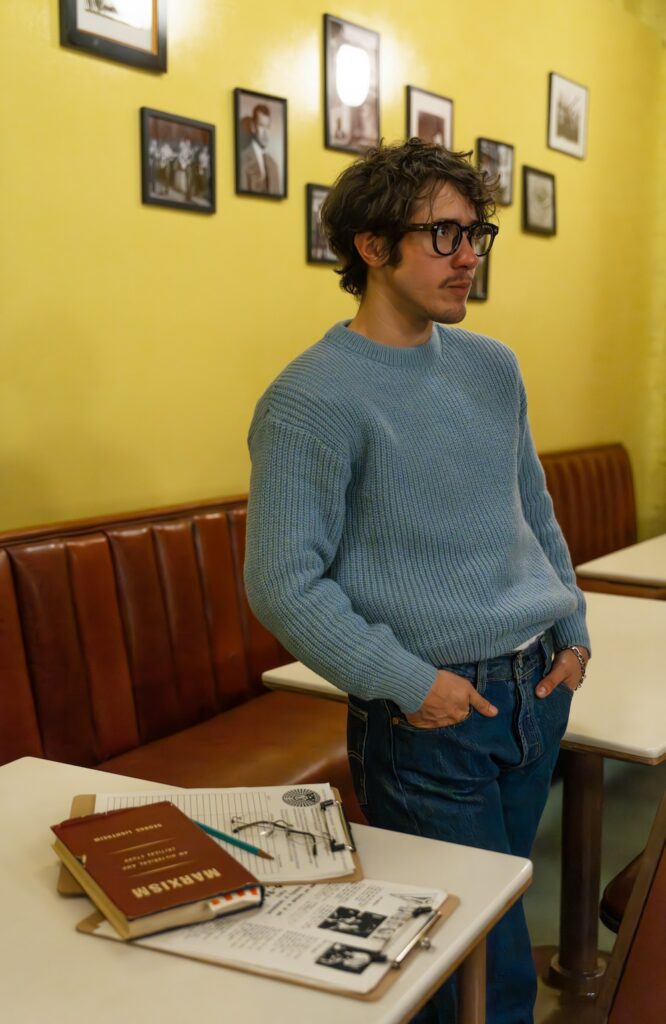
“They weren’t part of the riot per se, but they lived those struggles daily,” LeGrande adds. “This is not just dramatized history—it’s rooted in memory and the lived experience of our community.”
Writing the play was both an act of remembrance and resistance. Personna and LeGrande met weekly with Nassar in 2017 to share their stories and reconstruct the world of Compton’s Cafeteria.
They didn’t witness the riot themselves, but they knew the people, the place, and the social conditions intimately.
“It wasn’t just about one explosive night,” says Personna. “It was about the constant, everyday struggle to exist authentically.”
LeGrande echoes the emotional weight of the process. “Working on this project was the most challenging and rewarding experience of my life,” she says.
The characters depicted are not heroic archetypes, but full human beings facing stigma, abandonment, and danger while searching for dignity and belonging. It’s a story about friendship, survival, and the necessity of a chosen family—one that resonates just as strongly today.
As trans and queer communities face renewed political and social attacks, the revival of The Compton’s Cafeteria Riot couldn’t be more urgent. Anti-trans legislation is on the rise, hate crimes are increasing, and civil rights are under threat.
For the creators and performers involved in this production, the parallels between 1966 and 2025 are chilling—and motivating.
“Today, we find ourselves back in a time that feels more dangerous than before,” says Personna. “People who believe we don’t exist are more vocal and more empowered. Our stories are more important now than ever before.”
“This play is a reminder that people will only take so much before they rebel,” LeGrande adds. “It’s about standing up—not just in 1966, but now.”
What sets this production apart from other historical dramas is its immersive nature. Audiences don’t just watch the story unfold, they live it. From the diner food served at the table to the music that pulses through the jukebox, every sensory detail is designed to transport attendees back to the beating heart of the Tenderloin in the ‘60s.
But it’s not nostalgia the production aims to evoke—it’s understanding.
“Our play is not a dull academic history,” says Personna. “It’s a life lesson. These characters are human beings who deserve to live authentically.”
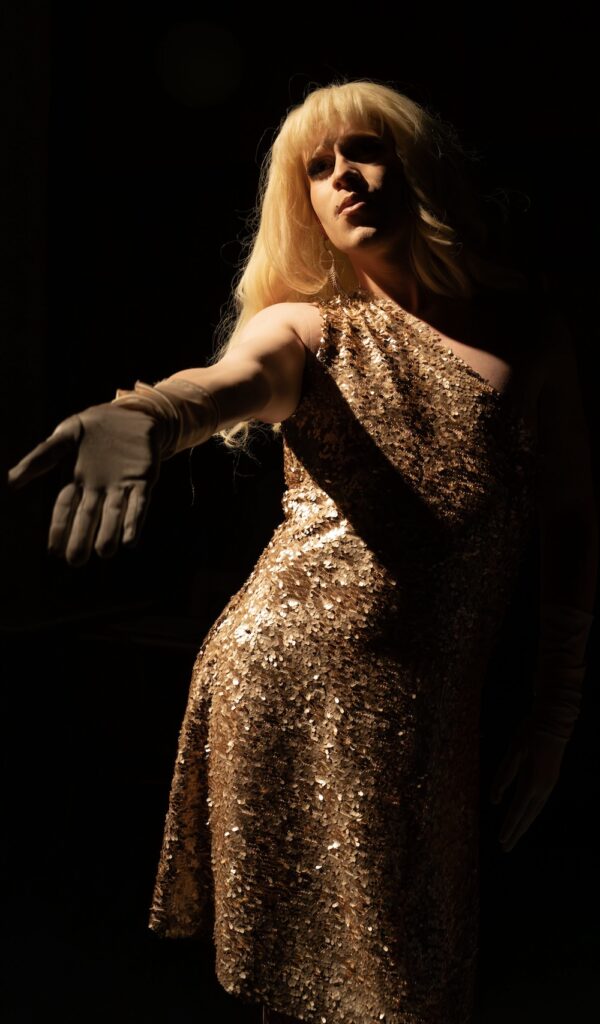
Reaves, too, is focused on the humanity at the center of the story.
“Music became a powerful element for me,” they say. “It’s how we explored tension, community, and resilience. It reminds us that even in the darkest moments, people still dance, sing, and dream.”
That this production is staged near where the original riot occurred is no accident. For the Tenderloin Museum, honoring the neighborhood’s role in queer and trans history is essential.
The new venue, transformed from a vacant storefront into a ‘60s-era diner, anchors the show in space and memory. It becomes a sacred ground, a place where history breathes and where those who were too often forgotten can finally be seen.
At a time when queer and trans rights are under siege, The Compton’s Cafeteria Riot is not just relevant, it’s revolutionary. It honors the past while speaking powerfully to the present. It invites audience members to bear witness, celebrate resilience, and continue the fight for equality.
“This is the beginning of LGBTQ+ liberation,” says LeGrande. “ It’s our history, our truth—and it’s happening right here in San Francisco.”
COMPTON’S CAFETERIA RIOT runs April 11 through July 26. 835 Larkin, SF. Tickets and more info here.


